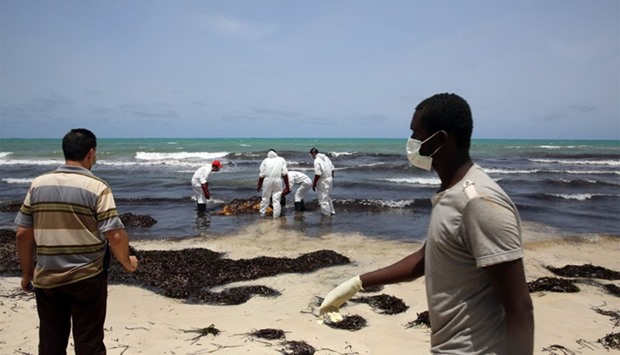"So far, 117 bodies have been found, 70 percent of them women and six children," Khames el-Boussefi, spokesman for the Libyan Red Crescent in the western town, told AFP.
"We are going out again to search around Zwara and nearby beaches," he said.
Earlier, Libyan navy spokesman Colonel Ayoub Qassem gave a similar count of bodies retrieved since Thursday evening, cautioning it was likely to rise since an average boat carries 115-125 passengers.
People smugglers have exploited the chaos gripping Libya since the 2011 uprising that overthrew dictator Moamer Kadhafi to traffic migrants across the Mediterranean Sea to Europe.
It is a lucrative business for the smugglers who cram migrants into boats that are small and unsafe for the perilous journey to Italy just 300 kilometres (190 miles) from Libya's shores.
Thousands of migrants try each year to make the crossing, but many drown when their boats founder.
Qassem said that migrant boats leaving from western Libya usually set off from the port cities of Sabratha and Zwara, with passengers who are mostly African or Arabs, many of them from Morocco.
The identities of the bodies found on Thursday were not yet known.
Qassem said it was not clear if the victims had been on three boats that capsized last week off the Libyan shores.
Survivors and the United Nations had said at the time that almost 700 migrants, including 40 children, who were on those boats had drowned.
Some 204,000 migrants and refugees have crossed the Mediterranean to Europe since January, the UN refugee agency said on Tuesday.
More than 2,500 people have died trying to make the crossing this year -- the vast majority of them between Libya and Italy -- as Europe battles its worst migration crisis since World War II.
Qassem criticised the failure of the international community to deal with the problem.
The global community limits itself to "counting bodies and issuing statements", he said.
The Zwara municipality also regretted what it called "the strange silence of all those in charge", including Libyan government officials and NGOs.
A statement on its Facebook page said Zwara "lacks all the means necessary to deal with such a problem".

Libyan Red Crescent personnel retrieve the body of a migrant that washed up on a Libyan beach on the coast of the northwestern Libyan port city of Zuwarah yesterday.
The bodies of at least 117 migrants trying to reach Europe, many of them women, have washed up on a beach in the Libyan town of Zwara, the Red Crescent said Friday.
